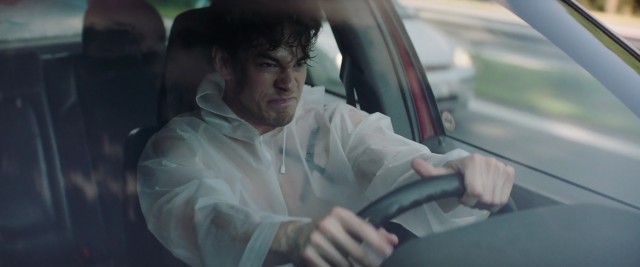One of our guiding principles is to seek out shorts that in some important way—tone, style, technique, plot, structure, et al— are different than what we could get from other mediums. It is a bias toward innovation that, in our mind, justifies short film’s serious consideration next to its richer and more professionalized cousins of features and TV. Yet this is a high bar to reach and if the Czech advertising star-turned-short filmmaker, Tomáš Brožek, doesn’t clear it in pure originality with his short film Igelit (Plastic), he does something exceedingly rare by identifying a beloved type of feature film that has fallen out of favor and porting it to short film with astonishing finesse.
Plastic employs several intertwining stories that cross over and diverge throughout its 18min runtime. A problem with a neighborhood’s water pipes provides the instigating event. At the same time, the plot follows an anti-plastic activist and her straight-edge husband heedlessly pursuing success under the influence of unscrupulous friends. A sexually aggressive former friend, a fish-loving boxing trainer, and a UN official figure into events in what ends up a tragic farce for all involved.
While the individual plot and character elements are well-handled, the surprise is the sheer number of them and the juggling act of their combination. The effect produced a pleasant nostalgia for me. When I was growing up, the interconnected-but-separate storyline film felt like a right of passage for directors seeking immortality. While in no way a pioneer of the approach, the phenomena that was Pulp Fiction sparked a decade-long mini-trend that produced big statement movies from top auteurs, like Paul Thomas Anderson (Magnolia, 1999), Alejandro González Iñárritu (Amores Perros, 2000), Steven Soderbergh (Traffic, 2000), and Richard Curtis (Love Actually, 2003…yeah I said it =P). The Oscar win for Crash (2004) ironically may have produced a backlash that tainted the entire subgenre, so while there are plenty of subsequent examples, they begin to taper off in both volume and cultural capital.

“The inspiration came from observing the daily pursuit of success, the desire to have everything instantly, just to unwrap the plastic wrapping.” – director Tomáš Brožek
Plastic serves as a callback to this period for me and while Brožek crafts a comedy with his short rather than a dour “important” film, I do think that, despite its modern preoccupations, its sharply sketched ensemble of horrible people would be right at home in the 90s. Nostalgia is not in itself a positive value though, so in addition to its wicked satire of contemporary society Plastic demands respect for its pure concision. Intertwining storyline films are, by necessity, known for their exacting structure, but the shrunken canvas of a short film magnifies the challenge. TV shows will adopt the approach for single episodes, but they have the benefit of audience familiarity with their characters and milieu before they dilute their narrative focus. Honestly, I struggle to recall short films that employ interconnected-but-separate storylines, so the fact that Brožek not only pulls it off with respect to making something coherent but manages to make it entertaining and enjoyable too, deserves high praise.
The film comes to us after a festival run that included Edinburgh and KURZSUECHTIG Leipzig. As mentioned, the self-taught filmmaker rose up in the Czech advertising industry as part of the directing duo Mugshots before turning his hand to narrative filmmaking, and the professional quality of the film’s craft is evident. Brožek tells us that he has two projects currently in development, a feature film and a TV series.

 Jason Sondhi
Jason Sondhi